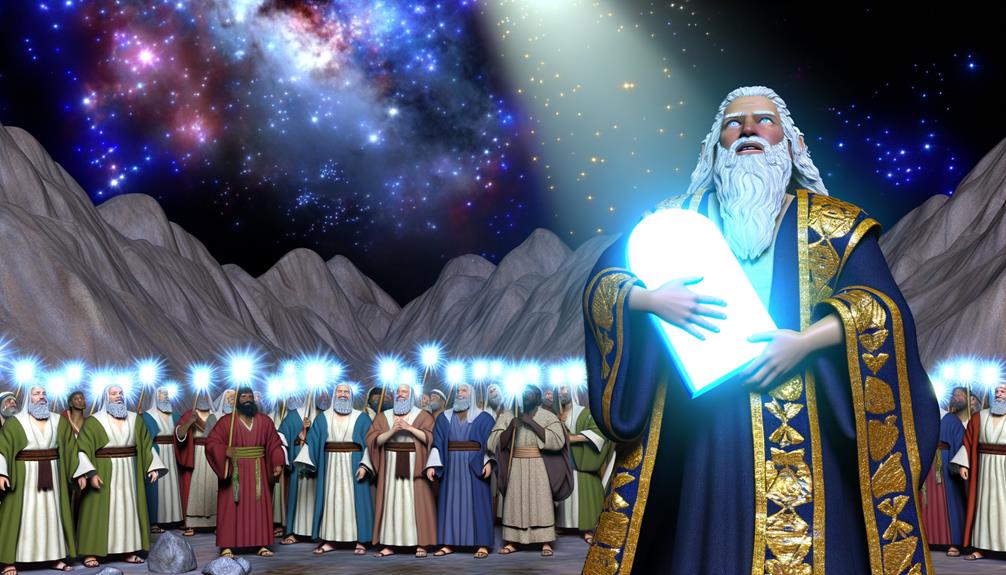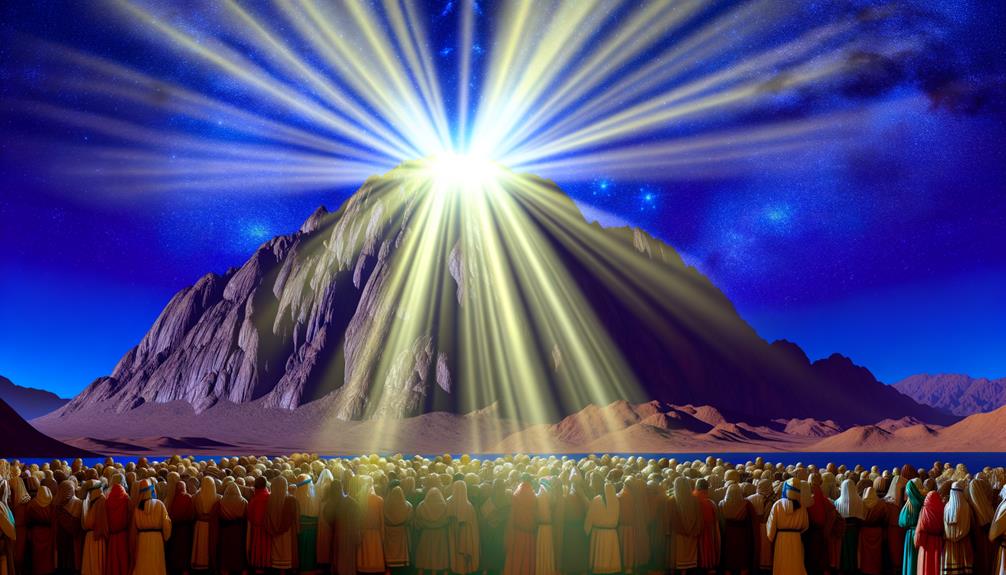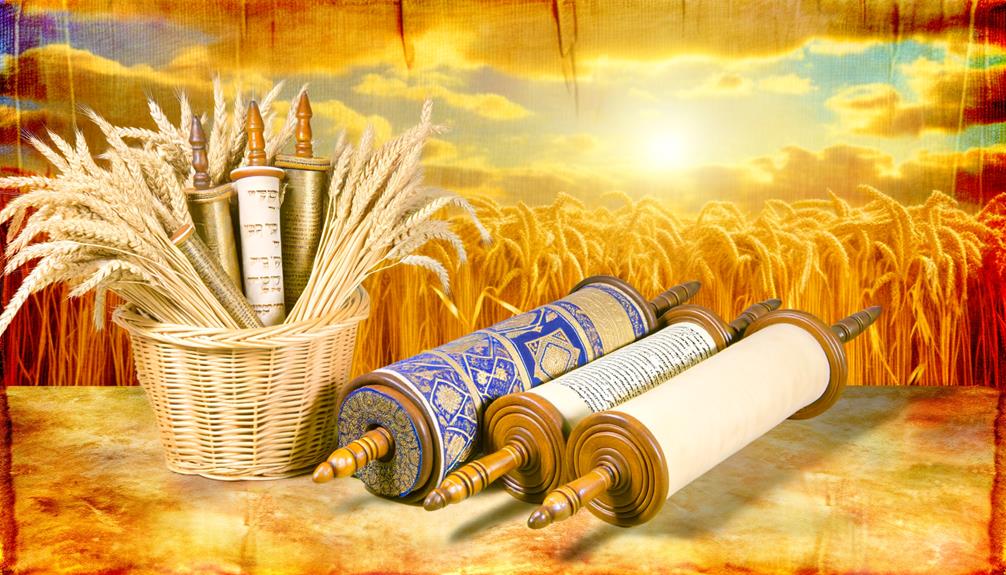Shavuot Meaning in the Bible: Feast of Weeks Explained
Shavuot, also known as the Feast of Weeks, holds significant meaning in the Bible as it commemorates the conclusion of the grain harvest and the giving of the Torah at Mount Sinai. Biblically rooted in texts such as Exodus 19-20 and Leviticus 23:15-21, Shavuot marks the establishment of the covenant between God and the Israelites.
This event, characterized by divine phenomena at Mount Sinai, emphasizes themes of divine revelation, spiritual enlightenment, and ethical responsibility. The period of counting the Omer, leading up to Shavuot, bridges physical sustenance with spiritual renewal, deeply intertwining Israelite identity with divine law.
Continue to uncover the profound layers of this multifaceted celebration.

Shavuot Meaning in the Bible: Feast of Weeks and Covenant Revelation
| Biblical Reference | Meaning of “Shavuot” | Context and Insight |
|---|---|---|
| Exodus 34:22 | Feast of Weeks (Shavuot) | Celebrated seven weeks after Passover, marking wheat harvest |
| Leviticus 23:15–21 | Offering of firstfruits | Commanded to bring grain offerings and celebrate with no work |
| Deuteronomy 16:9–12 | Celebration of freedom and giving | Linked to the Exodus, gratitude for blessings, and remembering slavery |
| Acts 2:1–4 | Pentecost fulfillment | The Holy Spirit descended on Shavuot, marking the birth of the Church |
| Numbers 28:26 | Holy convocation | Day of sacred assembly and special sacrifices to the Lord |
Origin of Shavuot

Rooted in ancient agrarian traditions, Shavuot, also known as the Feast of Weeks, marks a pivotal moment in biblical history as it commemorates both the conclusion of the grain harvest and the giving of the Torah at Mount Sinai.
Biblically, Shavuot is observed seven weeks after Passover, embodying a dual significance. Historically, it celebrates the spring harvest, as noted in Exodus 23:16. Theologically, it commemorates the divine revelation at Sinai, a cornerstone of Jewish faith.
In Exodus 19-20, the Israelites receive the Ten Commandments, establishing God’s covenant. This convergence of agricultural festival and spiritual renewal underscores Shavuot’s profound import, uniting physical sustenance with spiritual enlightenment, rendering it a feast of both harvest and divine instruction.
The Feast of Weeks

The Feast of Weeks, known in Hebrew as Shavuot, is intricately linked to the completion of the seven-week counting period known as the Omer, which begins on the second day of Passover. This festival, rich in historical context, marks the giving of the Torah at Mount Sinai, fifty days after the Exodus from Egypt.
Scripturally, Shavuot is mandated in Leviticus 23:15-21, emphasizing its agrarian roots and spiritual significance. Theologically, it represents the covenantal relationship between God and Israel, highlighting themes of divine revelation and communal responsibility.
| Aspect | Details | Scriptural Reference |
|---|---|---|
| Name | Shavuot (Feast of Weeks) | Leviticus 23:15-21 |
| Time Frame | 50 days after the second day of Passover | Leviticus 23:15 |
| Significance | Giving of the Torah at Mount Sinai | Exodus 19-20 |
Understanding Shavuot involves appreciating its dual nature as both a historical and theological milestone.
Counting the Omer

Counting the Omer serves as a spiritual bridge between Passover and Shavuot, meticulously marking the 49 days that culminate in the celebration of the giving of the Torah.
Rooted in Leviticus 23:15-16, this practice commands the Israelites to count seven complete weeks from the day after the Sabbath following Passover.
Theologically, the Omer period is a time for spiritual refinement and anticipation. Each day of counting symbolically elevates the worshiper’s connection to God, culminating in a heightened state of readiness to receive divine revelation.
Historically, this period also commemorates the agricultural cycle, linking the barley harvest of Passover to the wheat harvest of Shavuot.
Consequently, Counting the Omer intertwines agricultural, spiritual, and communal dimensions, enriching the observance of Shavuot.
The Giving of the Torah

As the Omer count reaches its culmination, Shavuot celebrates the pivotal moment in Jewish history when God bestowed the Torah upon the Israelites at Mount Sinai. This event is foundational, marking the covenant between God and His chosen people.
In Exodus 19-20, the narrative unfolds with divine manifestations of thunder, lightning, and the sound of the shofar, signifying the gravity of this divine revelation. Theologically, the giving of the Torah is seen as the moment when Jewish law and identity were solidified.
| Aspect | Description |
|---|---|
| Scriptural Basis | Exodus 19-20 |
| Divine Manifestations | Thunder, lightning, shofar sound |
| Theological Significance | Covenant between God and Israelites |
| Historical Impact | Foundation of Jewish law and identity |
This profound event continues to shape Jewish thought and practice.
Mount Sinai Event

Mount Sinai’s significance in Jewish tradition is underscored by the extraordinary phenomena that accompanied God’s revelation to the Israelites, as detailed in the Book of Exodus.
The biblical narrative describes thunder, lightning, a thick cloud upon the mountain, and the sound of a very loud trumpet, creating an atmosphere of awe and reverence (Exodus 19:16-19). These sensory experiences emphasized the divine presence and the gravity of the moment.
The mountain itself, enveloped in smoke due to the Lord descending upon it in fire, symbolized an intersection between the divine and the mortal domain.
This event not only marked a profound theophany but also reinforced the sanctity of the Torah, cementing Mount Sinai’s pivotal role in Jewish history and spirituality.
Covenant With God

The Covenant with God, established at Mount Sinai, signifies a pivotal moment in biblical history, marking the formal relationship between God and the Israelites.
Scriptural texts such as Exodus 19-24 provide a detailed account of this foundational event, outlining the Ten Commandments and other laws that encapsulate God’s promises and expectations.
This covenant not only defines the theological framework of Israelite identity but also underscores the enduring principles of divine commitment and human responsibility.
Significance of Covenant
In biblical tradition, Shavuot holds profound significance as it commemorates the momentous occasion of the Israelites entering into a covenant with God at Mount Sinai.
This covenant established the Israelites as God’s chosen people, bound by the Ten Commandments and the Torah. Theologically, it represents divine revelation and the formalization of a unique relationship between God and humanity.
Historically, this moment is pivotal, marking the foundation of Israelite identity and religious practice. The covenant underscores themes of fidelity, moral obligation, and community cohesion.
Through scriptural analysis, Shavuot is seen as a reaffirmation of faith and a reminder of the enduring promises between God and the Israelites, serving as a cornerstone of Jewish religious consciousness.
Biblical Texts Referencing
Scriptural references to the covenant between God and the Israelites provide a profound basis for understanding the theological and historical dimensions of Shavuot.
Key texts such as Exodus 19-20 recount the momentous event at Mount Sinai where God delivered the Torah to Moses, establishing a covenant that defined the Israelites as His chosen people.
This covenant is reiterated in Deuteronomy 5, emphasizing the enduring nature of this divine agreement.
The giving of the Torah, celebrated during Shavuot, underscores the Israelites’ commitment to God’s laws and their unique relationship with Him.
These biblical texts illuminate how Shavuot is not merely a harvest festival but a commemoration of a covenantal relationship central to Jewish identity and faith.
God’s Promises Explained
Central to understanding Shavuot is the exploration of God’s promises, which are intricately woven into the covenant established at Mount Sinai. This covenant, as described in Exodus 19-20, not only marks the giving of the Torah but also solidifies a divine promise of guidance and protection. Theologically, this moment signifies a mutual commitment: God’s laws and Israel’s obedience.
| Aspect | Scriptural Reference | Theological Insight |
|---|---|---|
| Covenant Terms | Exodus 19:5-6 | Holy nation, chosen people |
| Divine Promise | Exodus 19:9 | God’s continual presence |
| Israel’s Role | Exodus 19:8 | Obedience to the Torah |
| Torah Given | Exodus 20:1-17 | Divine law and ethics |
| Shavuot’s Link | Leviticus 23:15-21 | Feast of Weeks celebration |
This covenant relationship underscores the profound significance of Shavuot within the biblical narrative.
Spiritual Significance

The spiritual significance of Shavuot is intricately woven into the fabric of biblical narrative and theology, reflecting its profound importance in Jewish tradition and religious observance.
Biblically, Shavuot commemorates the giving of the Torah at Mount Sinai, a pivotal event in Exodus 19-20 that signifies the establishment of the covenant between God and Israel.
Theologically, this festival underscores themes of divine revelation and spiritual renewal, marking a moment of profound connection between the divine and humanity.
Historically, it also aligns with an agricultural celebration, the Feast of Weeks, symbolizing gratitude for God’s provision.
Consequently, Shavuot serves as a multifaceted observance, blending historical, scriptural, and theological elements to highlight its enduring spiritual relevance.
Themes of Revelation

The festival of Shavuot is intrinsically linked to the momentous event of Divine Law Giving at Mount Sinai, where the Israelites received the Ten Commandments.
This covenant at Sinai not only established a foundational legal and moral framework but also marked a profound instance of spiritual enlightenment for the community.
These themes of revelation underscore the transformative power of divine-human interaction and the enduring significance of Shavuot in Jewish theological thought.
Divine Law Giving
A pivotal aspect of Shavuot in biblical narratives is the momentous occasion of divine law giving at Mount Sinai, where God revealed the Ten Commandments to the Israelites. This event, as depicted in the Book of Exodus, signifies a profound theological moment, emphasizing the direct communication between the divine and humanity.
The Ten Commandments serve as the foundation for ethical and moral conduct within the Jewish faith. Key elements include:
- Divine Revelation: God’s direct communication underscores divine authority.
- Moral Framework: The commandments establish fundamental ethical guidelines.
- Community Identity: This revelation shapes the collective identity of the Israelites.
- Covenantal Relationship: The giving of the law signifies a binding agreement between God and His people.
This epochal event underscores Shavuot’s significance as a celebration of divine revelation.
Covenant at Sinai
Central to the themes of revelation at Sinai is the establishment of a covenant, which signifies a profound and enduring relationship between God and the Israelites, underscored by the giving of the Torah.
This covenant, as detailed in Exodus 19-24, is not merely a legal contract but a divine promise that binds the Israelites to God. The Torah serves as both a guide and confirmation to this unique relationship, setting forth commandments and ethical principles.
Theologically, the Sinai covenant marks a pivotal moment in biblical history, where Israel is consecrated as a ‘kingdom of priests and a holy nation’ (Exodus 19:6).
This foundational event underscores the mutual commitment, with God promising providence and Israel pledging obedience.
Spiritual Enlightenment Moment
Revelation at Sinai represents a profound moment of spiritual enlightenment, where divine wisdom was imparted to the Israelites through the giving of the Torah. This event encapsulates several key themes of revelation:
- Divine Encounter: The Israelites experienced a direct encounter with God, a foundational aspect of their faith.
- Moral Law: The Torah provided a thorough moral and ethical framework, guiding their conduct and community life.
- Covenantal Relationship: The giving of the Torah solidified the covenant between God and Israel, emphasizing their unique role and responsibilities.
- Universal Wisdom: Although given to Israel, the Torah’s teachings possess universal principles applicable to all humanity.
This moment of enlightenment endures as a touchstone of religious identity and theological reflection.
Shavuot in Scriptures

Shavuot, also known as the Feast of Weeks, is rooted in biblical texts such as Exodus 34:22, Leviticus 23:15-21, and Deuteronomy 16:9-12, where it is described as an agricultural festival and a time of covenant renewal.
Historically, it marks the end of the grain harvest and the offering of first fruits.
Scripturally, Leviticus outlines the counting of seven weeks from Passover to Shavuot, symbolizing spiritual preparation.
Theologically, Deuteronomy emphasizes gratitude and communal worship, reinforcing the covenant between God and Israel.
Exodus indicates Shavuot’s dual significance: celebrating the harvest and commemorating the giving of the Torah at Mount Sinai.
This duality underscores the intertwining of physical sustenance and spiritual enlightenment.
Conclusion
The confluence of agricultural celebration and profound spiritual revelation characterizes Shavuot.
Historically rooted in the Feast of Weeks, the festival marks the pivotal moment of receiving the Torah at Mount Sinai, symbolizing a covenant with God.
Scriptural analysis reveals themes of divine revelation and communal responsibility, offering theological insights into its enduring significance.
Consequently, Shavuot encapsulates a unique intersection of physical and spiritual domains, reinforcing its multifaceted importance within biblical tradition.






